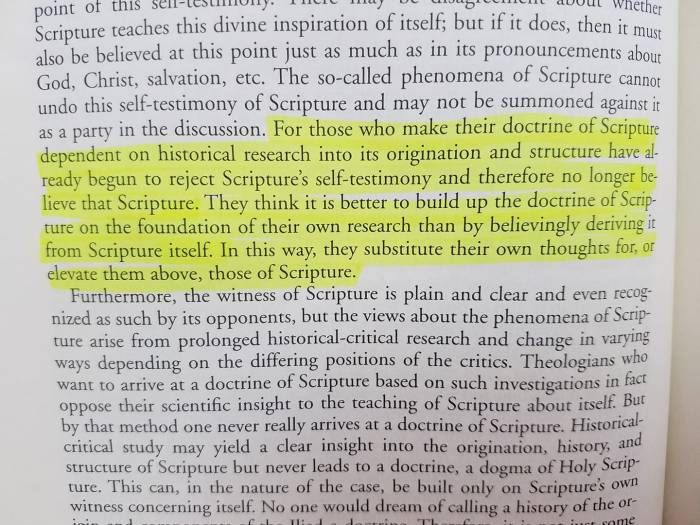Can one be a consistent Calvinist/ Reformed and use Textual Criticism to affirm the New Testament…? This major Calvinist scholar says no. Herman Bavinck says as follows:
“Those who make their doctrine of Scripture dependent on historical research into its origination and structure have already begun to reject Scripture’s self-testimony and therefore no longer believe that Scripture. They think it better to build up the doctrine of Scripture on the foundation of their own research than by believingly deriving it from Scripture itself.”
Source: Herman Bavinck, Reformed Dogmatics: Prolegomena, p. 424.

For more information on Bavinck, please click here for his Wikipedia page.
When I initially posted this on my personal Facebook profile, I was immediately reproached by Dr. James White. His argument varied, but it began with claiming I didn’t understand what Bavinck was saying, it then moved to the claim that Bavinck was not referring to textual criticism and finally it moved on to whether or not historical criticism includes textual criticism or not.
The point being, that Dr. White was clearly uncomfortable with this quote and the consequences it bore on his position as recently rebuked by James Simpson, Sam Shamoun and other Christians. I was most disappointed with his response, because as far as I and other Muslims viewed his comments, it seems as if he took the post personally. Beside the point, when I tried to explain that Bavinck’s quote could be applicable and inclusive of textual criticism, I included this statement:
I don’t disagree, read the page, historical-critical, it absolutely includes higher criticism, no one doubts that. Then again, no one else disagrees that there is a distinction between higher and lower criticism, any longer. There’s a bit of both involved in each discipline. Thanks for the fruitful replies though!
I think my statement was quite clear, when it comes to historical-critical study, there is an overlap, a bit of both higher and lower criticism. For some reason, which we all now know why, Dr. White chose to ignore that qualifying phrase of “a bit of both” and invectively chose to represent my argument as referring to absolutely no distinction between higher and lower criticism. It’s quite obvious that isn’t what I said but it’s the position he chose to stake his claim upon, shifting the goalposts if you would, and quite disappointing for someone who seeks to understand his opponents’ points of view. I forgive him for that.
In any case, yes, historical-critical research does include higher and lower criticism, which encompasses textual criticism. In the end, this quote does have ramifications for Reformed folk who choose to view the New Testament through the eyes of history to validate variant units. I gave one such example to qualify my point which was noted by all, that Dr. White intentionally chose to ignore:
With all due respect, when using philology to develop an authorial profile to help us with stemmata, don’t we have to refer to historical information/ data in that very process?
We look for language development, basically the way someone represents language changes over time and so we can demarcate eras of language use within the written tradition and delineate forms of writing over time. To do so, especially in textual criticism, we have to be aware of the language, its form, variations, standards, etc. In conclusion, distractions aside, this quote is damning for some of the more prolific Christian apologists and the untenable positions they hold to.
and God knows best.
Categories: Biblical scholarship, Debates, Missionaries
It seems that Christians cannot have it both ways.
Christians must either take their Biblical scripture’s self testimony “as is” and thereby accept all of the contradictions, misstatements and historical problems and errors etc. OR they can understand their scriptural doctrine through historical textual criticism, which in effect entails a fundamental basic rejection of the scriptures infallibility in the first place.
Alhamdullah, Islam does not have the same problems, as the self testimony of the Qur’an is not at odds with the historical record, and therefore it is not an either/or question.
LikeLiked by 2 people
I agree with Bavink. Although I have read some of his writings this quote was not familiar to me. Thanks for pointing it out. My opinion is that White is unfortunately undoing the work of all those who faithfully copied the text under the influence of God’s providential power.
LikeLike
Again, James is not honest rather he is so delusive when it comes to this subject, Don’t be fooled by his preaching and the tone of “love” he sells to muslims.
James just uses verbal gymnastics, and that exactly what Qur’an has told us about those people
“And indeed, there is among them a party who alter the Scripture with their tongues so you may think it is from the Scripture, but it is not from the Scripture. And they say, “This is from Allah,” but it is not from Allah . And they speak untruth about Allah while they know.” QT 3:78
LikeLike
The key word is “dependent” in that statement. As a scholar himself, Bavinck wouldn’t and in fact doesn’t, dispute good scholarly studies. But when one puts their “faith” so to speak in their studies above the self testimony of the triune God’s words, then of course there is a problem.
I’m surprised (well not overly) that you posted this. As a Muslim I’m fsirly certain your acceptance of the Koran comes from its self testimony, but I doubt you would dismiss scholarly studies.
Why do you hatechristians so much?
LikeLike